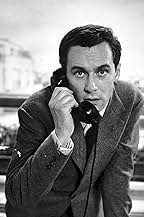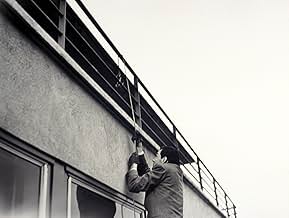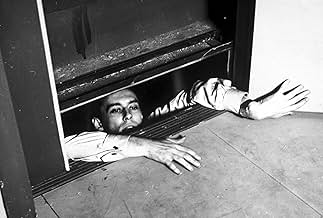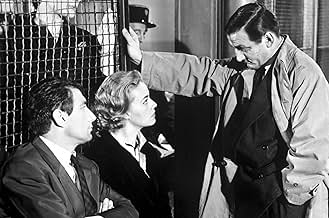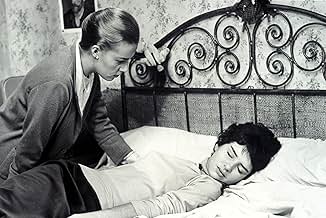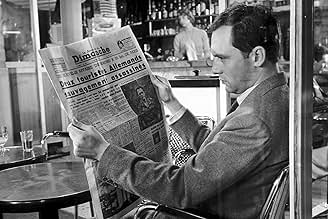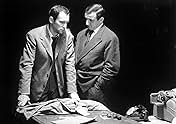IMDb-BEWERTUNG
7,9/10
30.485
IHRE BEWERTUNG
Ein selbstbewusster Geschäftsmann ermordet seinen Arbeitgeber, den Ehemann seiner Geliebten, was ungewollt eine Kette von Ereignissen in Gang setzt.Ein selbstbewusster Geschäftsmann ermordet seinen Arbeitgeber, den Ehemann seiner Geliebten, was ungewollt eine Kette von Ereignissen in Gang setzt.Ein selbstbewusster Geschäftsmann ermordet seinen Arbeitgeber, den Ehemann seiner Geliebten, was ungewollt eine Kette von Ereignissen in Gang setzt.
- Auszeichnungen
- 1 wins total
Empfohlene Bewertungen
Elevator to the Gallows is a great film and even better, has a short running time! The acting is great in every instance, the plot is original, and the direction is probably among the best I've ever seen. I loved how the plot had a lot of twists but there weren't so many that you were confused as to what was going on. Although I won't reveal the ending, I thought it was great and made me smile. However, you have to like this type of movie to see it, as it is kind of complicated and there isn't a ton of action. This film shows how the perfect murder can be only planned so well; you can never plan what could happen. If you don't get bored too easily, stick with this gem and I'm sure you'll love it.
Ascenseur pour l'échafaud (AKA: Elevator to the Gallows/Lift to the Scaffold) is directed by Louis Malle and co-written by Malle, Roger Nimier and Noël Calef (novel). It stars Jeanne Moreau, Maurice Ronet, Georges Poujouly, Yori Bertin and Jean Wall. Music is by Miles Davis and cinematography by Henri Decaë.
A little ole devil this one, a sly slow pacer that itches away at your skin. Rightly seen as a bridging movie between the classic film noir cycle and the nouvelle vague, Malle's movie is in truth straightforward on narrative terms. Julien Tavernier (Ronet) is going to kill husband of his lover, Florence Carala (Moreau), who also happens to be his boss, but upon executing the perfect murder, he, through his own absent mindedness, winds up stuck in a lift close to the crime scene. Outside Florence is frantically awaiting his arrival so as to begin their life together in earnest, but when a couple of young lovers steal Julien's car, Florence gets the wrong end of the stick and a sequence of events lead to Julien and Florence hitching that ride to the gallows.
Simplicity of narrative be damned, Malle's movie is a classic case of that mattering not one jot. There is style to burn here, with bleak atmospherics dripping from every frame, and Miles Davis' sultry jazz music hovers over proceedings like a sleazy grim reaper. The ironic twists in the writing come straight off the bus to noirville, putting stings in the tale, the smart reverse of the norm finding Moreau (sensual) wandering the streets looking for her male lover, while elsewhere he's in isolation and a doppleganger murder scenario is cunningly being played out. Decaë's photography has a moody desperation about it that so fits the story, the use of natural light making fellow French film makers sit up and take notice. While the dialogue, and the caustic aside to arms dealings, ensures we know that Malle can be a sly old fox. He really should have done more noir like pictures.
A film that convinces us that Julien and Florence are deeply in love and passionate about each other, and yet they never are once together in the whole movie! It's just one of the many wonderful things about Louis Malle's excellent picture.
Remember folks, the camera never lies... 9/10
A little ole devil this one, a sly slow pacer that itches away at your skin. Rightly seen as a bridging movie between the classic film noir cycle and the nouvelle vague, Malle's movie is in truth straightforward on narrative terms. Julien Tavernier (Ronet) is going to kill husband of his lover, Florence Carala (Moreau), who also happens to be his boss, but upon executing the perfect murder, he, through his own absent mindedness, winds up stuck in a lift close to the crime scene. Outside Florence is frantically awaiting his arrival so as to begin their life together in earnest, but when a couple of young lovers steal Julien's car, Florence gets the wrong end of the stick and a sequence of events lead to Julien and Florence hitching that ride to the gallows.
Simplicity of narrative be damned, Malle's movie is a classic case of that mattering not one jot. There is style to burn here, with bleak atmospherics dripping from every frame, and Miles Davis' sultry jazz music hovers over proceedings like a sleazy grim reaper. The ironic twists in the writing come straight off the bus to noirville, putting stings in the tale, the smart reverse of the norm finding Moreau (sensual) wandering the streets looking for her male lover, while elsewhere he's in isolation and a doppleganger murder scenario is cunningly being played out. Decaë's photography has a moody desperation about it that so fits the story, the use of natural light making fellow French film makers sit up and take notice. While the dialogue, and the caustic aside to arms dealings, ensures we know that Malle can be a sly old fox. He really should have done more noir like pictures.
A film that convinces us that Julien and Florence are deeply in love and passionate about each other, and yet they never are once together in the whole movie! It's just one of the many wonderful things about Louis Malle's excellent picture.
Remember folks, the camera never lies... 9/10
Greetings again from the darkness. The phrase Film Noir conjures up a certain feel and look and "Gallows" certainly captures what we have come to expect from the genre. However, the great director Louis Malle goes even further with his minimalistic approach to sound, lighting and dialog. Where 1944's "Double Indemnity" wreaks explosive on screen passion, Malle offers up a quiet simmering that draws the viewer into the lives of the main characters.
Jeanne Moreau is the perfect pouty French femme fatale. Her scenes of walking (wandering) the dark, rainy streets of Paris are chilling to watch for film lovers. The weak lighting and lack of make-up allow Moreau's true emotions to guide us. Malle also is tremendous in his filming of the elevator scenes with Maurice Ronet.
The secondary characters of the young lovers played by Yori Bertin (Veronique) and George Poujouly (Louis) are unmistakable in their likeness to Natalie Wood and James Dean. Watching two young kids carelessly destroy their own lives, as well as that of others, is quite the contrast to the well-conceived scheme of Moreau and Ronet.
I have not been able to come up with an apt description of the powerfully improvised jazz score from the legendary Miles Davis. The approach has been mimicked over the years, but never duplicated. It is startling in its ability to slap the viewer in the face! Moreau is of course a screen legend and went on to star in "Jules and Jim", Truffaut's "The Four Hundred Blows" and my personal favorite, "The Bride Wore Black". As great as she was in all of these, I am not sure her essence was ever better captured than her wandering through the Paris streets in "Elevator to the Gallows".
Jeanne Moreau is the perfect pouty French femme fatale. Her scenes of walking (wandering) the dark, rainy streets of Paris are chilling to watch for film lovers. The weak lighting and lack of make-up allow Moreau's true emotions to guide us. Malle also is tremendous in his filming of the elevator scenes with Maurice Ronet.
The secondary characters of the young lovers played by Yori Bertin (Veronique) and George Poujouly (Louis) are unmistakable in their likeness to Natalie Wood and James Dean. Watching two young kids carelessly destroy their own lives, as well as that of others, is quite the contrast to the well-conceived scheme of Moreau and Ronet.
I have not been able to come up with an apt description of the powerfully improvised jazz score from the legendary Miles Davis. The approach has been mimicked over the years, but never duplicated. It is startling in its ability to slap the viewer in the face! Moreau is of course a screen legend and went on to star in "Jules and Jim", Truffaut's "The Four Hundred Blows" and my personal favorite, "The Bride Wore Black". As great as she was in all of these, I am not sure her essence was ever better captured than her wandering through the Paris streets in "Elevator to the Gallows".
The best laid plans seldom consider the unexpected, with the most subtle of causes, the opportunities taken, resulting in profoundly unfortunate effects. An elegantly structured piece of story telling with sound, pictures and performances raised to the rafters, this is a piece of cinema you will struggle to shear away from and, with luck, it wont leave you hanging.
10noralee
"Elevator to the Gallows (Ascenseur pour l'échafaud)" is a master work, so it's startling to learn that it was Louis Malle's first feature. It's a mother lode textbook of how-to for noir genre filmmakers as he creates his own style from what he's learned from other masters.
Malle pays tribute to the tense murder style of Hitchcock with Billy Wilder's cynicism of selfishness a la "Double Indemnity" plus Graham Greene-like, post-war politics from "The Third Man"-- and arms and oil dealers with military pasts in the Middle East are not outdated let alone adulterous lovers and rebellious teenagers.
The film drips with sex and violence without actually showing either -- sensuous Jeanne Moreau walking through a long, rainy Paris night is enough to incite both.
The black and white cinematography by Henri Decaë is breathtakingly beautiful in this newly struck 35 mm print, from smokey cafés with ever watchful eyes like ours to the titular, ironic alibi's long shafts (which surely must have inspired a key, far paler scene in "Speed") to highway lights, to a spare interrogation box, but particularly in the street scenes. The coincidences and clues are built up, step by step, visually, including the final damning evidence.
Miles Davis's improvisations gloriously and agitatedly burst forth as if pouring from the cafés and radios, but the bulk of the film is startlingly silent, except for ambient sounds like rain that adds to the tension in the plot.
The characters are archetypes -- the steely ex-Legonnaire, the James Dean and Natalie Wood imitators, the preening prosecutor -- that fit together in a marvelous puzzle. But all are cool besides Moreau's fire, as she dominates the look of the film, just wandering around Paris.
There is some dialog that doesn't quite make sense at the end, but, heck, neither does "The Big Sleep" and this is at least in that league, if not higher in the pantheon.
Malle pays tribute to the tense murder style of Hitchcock with Billy Wilder's cynicism of selfishness a la "Double Indemnity" plus Graham Greene-like, post-war politics from "The Third Man"-- and arms and oil dealers with military pasts in the Middle East are not outdated let alone adulterous lovers and rebellious teenagers.
The film drips with sex and violence without actually showing either -- sensuous Jeanne Moreau walking through a long, rainy Paris night is enough to incite both.
The black and white cinematography by Henri Decaë is breathtakingly beautiful in this newly struck 35 mm print, from smokey cafés with ever watchful eyes like ours to the titular, ironic alibi's long shafts (which surely must have inspired a key, far paler scene in "Speed") to highway lights, to a spare interrogation box, but particularly in the street scenes. The coincidences and clues are built up, step by step, visually, including the final damning evidence.
Miles Davis's improvisations gloriously and agitatedly burst forth as if pouring from the cafés and radios, but the bulk of the film is startlingly silent, except for ambient sounds like rain that adds to the tension in the plot.
The characters are archetypes -- the steely ex-Legonnaire, the James Dean and Natalie Wood imitators, the preening prosecutor -- that fit together in a marvelous puzzle. But all are cool besides Moreau's fire, as she dominates the look of the film, just wandering around Paris.
There is some dialog that doesn't quite make sense at the end, but, heck, neither does "The Big Sleep" and this is at least in that league, if not higher in the pantheon.
Wusstest du schon
- WissenswertesMiles Davis recorded the music in a single recording session while he watched a screening. He composed it while watching a rough cut and then invited a quartet of French and US musicians in a for few hours (from 11pm to 5am one night), improvising each number and allegedly sipping champagne with Jeanne Moreau and Louis Malle.
- PatzerWhen Florence arrives at the motel, the photos are just being developed - with the lights on! Exposing the prints to light before fixation would make them turn black. By the way, it's not recommended to put your hands into developer.
- Zitate
Julien Tavernier: Don't sneer at war. It's your bread and butter. Indochina netted you how much? And now Algeria. Have some respect for war. It's your family heirloom.
- SoundtracksAscenseur Pour L'Échafaud (Générique)
Composed by Miles Davis
Performed by Miles Davis (Trumpet), Barney Wilen (Tenor Saxophone), Emilhenco (as René Urtreger) (Piano), Pierre Michelot (Bass) and Kenny Clarke (Drums)
Top-Auswahl
Melde dich zum Bewerten an und greife auf die Watchlist für personalisierte Empfehlungen zu.
- How long is Elevator to the Gallows?Powered by Alexa
Details
- Erscheinungsdatum
- Herkunftsland
- Offizielle Standorte
- Sprachen
- Auch bekannt als
- Elevator to the Gallows
- Drehorte
- 26 Rue de Courcelles, Paris 8, Paris, Frankreich(Tavernier climbing on the upper terrace)
- Produktionsfirma
- Weitere beteiligte Unternehmen bei IMDbPro anzeigen
Box Office
- Bruttoertrag in den USA und Kanada
- 374.671 $
- Eröffnungswochenende in den USA und in Kanada
- 7.354 $
- 26. Juni 2005
- Weltweiter Bruttoertrag
- 431.784 $
- Laufzeit1 Stunde 31 Minuten
- Farbe
- Seitenverhältnis
- 1.66 : 1
Zu dieser Seite beitragen
Bearbeitung vorschlagen oder fehlenden Inhalt hinzufügen

Oberste Lücke
By what name was Fahrstuhl zum Schafott (1958) officially released in India in English?
Antwort

